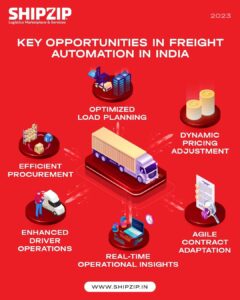
2.02.24
India’s logistics sector is currently experiencing a remarkable growth trajectory, poised to reach a staggering USD 484.43 billion by 2029, with a remarkable growth rate of 16.2% in automation within the freight forwarding industry. This remarkable expansion is not just a matter of scale but signifies a profound evolution in the way logistics operations are conducted.
A significant driver of this evolution is the integration of advanced freight corridors and the adoption of digital systems such as the e-way bill. These technological advancements are catalyzing a paradigm shift by directly addressing critical challenges that have long plagued the last-mile logistics sector. By enhancing speed, efficiency, and agility in logistics operations, these advancements are revolutionizing the way goods are transported and delivered across India.
Here are some ways automation is solving key challenges in freight logistics, paving the way for a more efficient and streamlined industry:

Traditional procurement processes can be time-consuming and costly. Companies often struggle with optimizing their buying strategies to minimize costs and reduce lead times.
Intelligent automation can optimize buying strategies through the implementation of procurement intelligence systems. These systems leverage data analytics to identify cost-saving opportunities, reduce lead times, and enhance supplier relationships, ultimately resulting in substantial cost reduction and time savings.
Variability in shipment sizes and destinations can complicate load planning and lead to inefficiencies in the transportation process.
Machine learning algorithms are instrumental in analyzing historical shipment data trends and seasonality. By identifying patterns and predicting future demand, these algorithms assist in efficient load planning, ensuring that resources are allocated optimally.
Fluctuating demand, capacity constraints, fuel costs, and market conditions can result in unpredictable freight charges.
AI algorithms and automated transportation systems are capable of dynamically adjusting pricing and optimizing rates based on real-time factors. This includes demand fluctuations, capacity availability, fuel costs, and market conditions, ensuring that freight charges remain competitive and predictable.
These intelligent automation solutions empower the freight forwarding and logistics industry to address its key challenges effectively, ultimately driving enhanced speed, efficiency, and agility in logistics operations. By harnessing the power of automation, companies can position themselves for success in the dynamic and rapidly evolving landscape of freight forwarding and logistics in India.
Conventional contracting methods may not adapt well to rapidly changing market dynamics, hindering a company’s agility in responding to real-time shifts.
Introducing flexible Request for Proposal (RFP) systems is a game-changer in addressing the challenge of rigid contracting in dynamic markets. These systems allow companies to quickly adapt to real-time market changes by streamlining the procurement process. By enabling companies to modify contracts and terms swiftly, they promote agility in contracting, ensuring that businesses can respond effectively to shifting market conditions. This flexibility not only enhances competitiveness but also fosters better relationships between shippers and logistics providers.
Real-time data gaps can lead to a lack of transparency and accountability in logistics operations, resulting in inefficiencies and potential errors.
The implementation of real-time data tracking systems is instrumental in addressing operational gaps within the logistics sector. These systems provide a comprehensive view of every aspect of the supply chain, from inventory levels to shipment status. By collecting and analyzing real-time data, logistics companies can make informed decisions, optimize routes, and allocate resources efficiently. This transparency and accountability not only reduce operational gaps but also enhance overall efficiency, customer satisfaction, and trust in the logistics process.
Poor management of drivers can affect driver safety, productivity, and overall transportation efficiency.
Real-time updates and management systems are pivotal in improving driver management within the logistics industry. These systems offer real-time visibility into driver activities, enabling companies to maintain a healthy driver roster, ensure driver safety, and enhance productivity. With real-time updates on driver locations, schedules, and performance, any logistics company can address issues promptly, minimize downtime, and optimize delivery schedules. This not only benefits the company but also contributes to safer and more efficient transportation networks.
The future of the freight forwarding and logistics industry is profoundly influenced by the ongoing wave of intelligent automation. Over the long term, we can expect significant implications:
Enhanced Efficiency: Intelligent automation will continue to drive efficiency gains in logistics operations, reducing costs and lead times.
Customer-Centric Solutions: Companies will increasingly focus on providing tailored, customer-centric logistics solutions with the help of data-driven insights.
Sustainability Initiatives: Automation will enable logistics companies to adopt greener practices, reducing the industry’s environmental footprint.
Advanced Robotics: The integration of robotics, including autonomous vehicles and drones, will reshape last-mile delivery and warehouse management.
Blockchain Technology: Blockchain will enhance transparency, security, and traceability in supply chains, reducing fraud and errors.
Artificial Intelligence and Machine Learning: These technologies will play a more significant role in demand forecasting, route optimization, and risk management.
Industry 4.0 Integration: The logistics sector will continue to integrate with Industry 4.0 concepts, including the Internet of Things (IoT) and cyber-physical systems.
In conclusion, the freight forwarding and logistics sector in India is undergoing a remarkable transformation, driven by the power of intelligent automation. This technology is not only reshaping the industry but also addressing key challenges such as inefficient procurement, scattered shipments, and uncertainty in freight charges.
As we look ahead, it’s clear that intelligent automation is the future of logistics. Companies that embrace these solutions will enjoy increased efficiency, cost savings, and improved customer satisfaction.